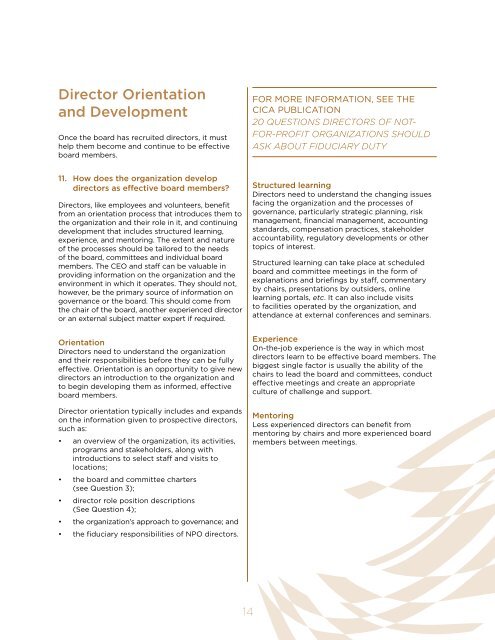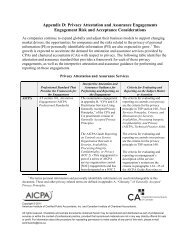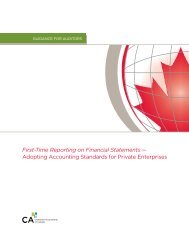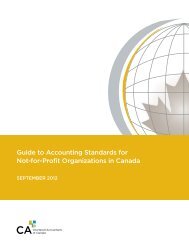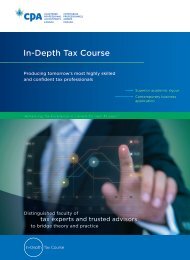20 Questions Directors of Not-for-Profit Organizations Should Ask ...
20 Questions Directors of Not-for-Profit Organizations Should Ask ...
20 Questions Directors of Not-for-Profit Organizations Should Ask ...
Create successful ePaper yourself
Turn your PDF publications into a flip-book with our unique Google optimized e-Paper software.
Director Orientation<br />
and Development<br />
Once the board has recruited directors, it must<br />
help them become and continue to be effective<br />
board members.<br />
<strong>for</strong> more in<strong>for</strong>mation, see the<br />
cica publication<br />
<strong>20</strong> <strong>Questions</strong> <strong>Directors</strong> <strong>of</strong> not<strong>for</strong>-pr<strong>of</strong>it<br />
organizations should<br />
ask about fiduciary duty<br />
11.<br />
How does the organization develop<br />
directors as effective board members<br />
<strong>Directors</strong>, like employees and volunteers, benefit<br />
from an orientation process that introduces them to<br />
the organization and their role in it, and continuing<br />
development that includes structured learning,<br />
experience, and mentoring. The extent and nature<br />
<strong>of</strong> the processes should be tailored to the needs<br />
<strong>of</strong> the board, committees and individual board<br />
members. The CEO and staff can be valuable in<br />
providing in<strong>for</strong>mation on the organization and the<br />
environment in which it operates. They should not,<br />
however, be the primary source <strong>of</strong> in<strong>for</strong>mation on<br />
governance or the board. This should come from<br />
the chair <strong>of</strong> the board, another experienced director<br />
or an external subject matter expert if required.<br />
Orientation<br />
<strong>Directors</strong> need to understand the organization<br />
and their responsibilities be<strong>for</strong>e they can be fully<br />
effective. Orientation is an opportunity to give new<br />
directors an introduction to the organization and<br />
to begin developing them as in<strong>for</strong>med, effective<br />
board members.<br />
Director orientation typically includes and expands<br />
on the in<strong>for</strong>mation given to prospective directors,<br />
such as:<br />
• an overview <strong>of</strong> the organization, its activities,<br />
programs and stakeholders, along with<br />
introductions to select staff and visits to<br />
locations;<br />
• the board and committee charters<br />
(see Question 3);<br />
• director role position descriptions<br />
(See Question 4);<br />
• the organization’s approach to governance; and<br />
• the fiduciary responsibilities <strong>of</strong> NPO directors.<br />
Structured learning<br />
<strong>Directors</strong> need to understand the changing issues<br />
facing the organization and the processes <strong>of</strong><br />
governance, particularly strategic planning, risk<br />
management, financial management, accounting<br />
standards, compensation practices, stakeholder<br />
accountability, regulatory developments or other<br />
topics <strong>of</strong> interest.<br />
Structured learning can take place at scheduled<br />
board and committee meetings in the <strong>for</strong>m <strong>of</strong><br />
explanations and briefings by staff, commentary<br />
by chairs, presentations by outsiders, online<br />
learning portals, etc. It can also include visits<br />
to facilities operated by the organization, and<br />
attendance at external conferences and seminars.<br />
Experience<br />
On-the-job experience is the way in which most<br />
directors learn to be effective board members. The<br />
biggest single factor is usually the ability <strong>of</strong> the<br />
chairs to lead the board and committees, conduct<br />
effective meetings and create an appropriate<br />
culture <strong>of</strong> challenge and support.<br />
Mentoring<br />
Less experienced directors can benefit from<br />
mentoring by chairs and more experienced board<br />
members between meetings.<br />
14


